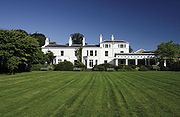
Chancellors Hotel & Conference Centre
Encyclopedia

Fallowfield
Ladybarn is the part of Fallowfield to the south-east. Chancellors Hotel & Conference Centre is used by the University of Manchester: it was built by Edward Walters for Sir Joseph Whitworth, as were the Firs Botanical Grounds.-Religion:...
, Manchester
Manchester
Manchester is a city and metropolitan borough in Greater Manchester, England. According to the Office for National Statistics, the 2010 mid-year population estimate for Manchester was 498,800. Manchester lies within one of the UK's largest metropolitan areas, the metropolitan county of Greater...
, England
England
England is a country that is part of the United Kingdom. It shares land borders with Scotland to the north and Wales to the west; the Irish Sea is to the north west, the Celtic Sea to the south west, with the North Sea to the east and the English Channel to the south separating it from continental...
The house was built in 1850 for Sir Joseph Whitworth, by Edward Walters
Edward Walters
Edward Walters was an English architect. After superintending Sir John Rennie's military building work in Constantinople between 1832 and 1837, he returned to England to practise as an architect in the provinces...
, who was also responsible for Manchester’s Free Trade Hall
Free Trade Hall
The Free Trade Hall, Peter Street, Manchester, was a public hall constructed in 1853–6 on St Peter's Fields, the site of the Peterloo Massacre and is now a hotel. The hall was built to commemorate the repeal of the Corn Laws in 1846. The architect was Edward Walters The hall subsequently was...
and Strangeways Prison. The house was surrounded by a 52 acres (21 ha) estate. Whitworth used The Firs mainly as a social, political and business base, entertaining radicals of the age such as John Bright
John Bright
John Bright , Quaker, was a British Radical and Liberal statesman, associated with Richard Cobden in the formation of the Anti-Corn Law League. He was one of the greatest orators of his generation, and a strong critic of British foreign policy...
, Richard Cobden
Richard Cobden
Richard Cobden was a British manufacturer and Radical and Liberal statesman, associated with John Bright in the formation of the Anti-Corn Law League as well as with the Cobden-Chevalier Treaty...
, William Forster
William Forster
William Forster was an Australian politician, Premier of New South Wales from 27 October 1859 to 9 March 1860 and poet.Forster was described in his youth as a "sallow, thin, saturnine young gentleman"...
and T. H. Huxley at the time of the Reform Bill of 1867. Whitworth, credited with raising the art of machine-tool
Machine tool
A machine tool is a machine, typically powered other than by human muscle , used to make manufactured parts in various ways that include cutting or certain other kinds of deformation...
building to a previously-unknown level, supported the new Mechanics Institute in Manchester
Manchester
Manchester is a city and metropolitan borough in Greater Manchester, England. According to the Office for National Statistics, the 2010 mid-year population estimate for Manchester was 498,800. Manchester lies within one of the UK's largest metropolitan areas, the metropolitan county of Greater...
–the birthplace of UMIST
UMIST
The University of Manchester Institute of Science and Technology was a university based in the centre of the city of Manchester in England. It specialised in technical and scientific subjects and was a major centre for research...
– and helped to found the Manchester School of Design. To the rear of Chancellors, on the site of the Firs Botanical Gardens
Firs Botanical Grounds
The Firs Botanical Grounds in Manchester, England, is a botanical garden that is part of what was once the estate of Joseph Whitworth.-See also:* The Firs - The mansion that formed the centre of the estate.-External links:*...
belonging to The University of Manchester, Whitworth had a shooting range — now the site of the University's horticultural glasshouses — on which he tested his famous but unsuccessful Whitworth gun featuring a rifled barrel.
In 1882, having built a new house in Darley Dale
Darley Dale
Darley Dale, also known simply as Darley, is a town in Derbyshire, England, with a population of around 6,000 people. It lies north of Matlock, on the River Derwent and the A6 road.- History :...
, Whitworth leased The Firs to his friend C.P. Scott, editor of the Manchester Guardian. After Scott's death the house became the property of the University of Manchester
University of Manchester
The University of Manchester is a public research university located in Manchester, United Kingdom. It is a "red brick" university and a member of the Russell Group of research-intensive British universities and the N8 Group...
, and was the Vice-Chancellor's residence until 1991.
The house was converted into a hotel and re-opened as the western wing of Chancellors Hotel & Conference Centre in 1997. Today the house is surrounded by five and a half acres of gardens.
External links
- Chancellors Website
- Chancellors Hotel & Conference Centre, Fallowfield - Profile on iKnow North West.

